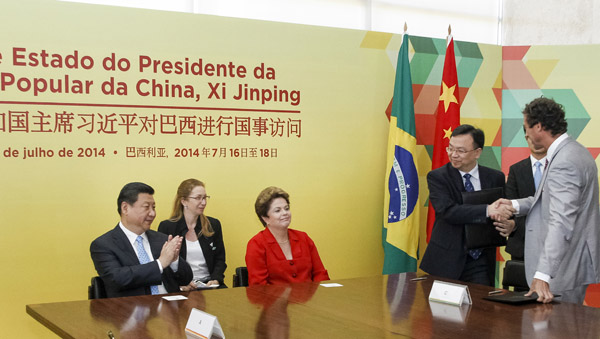BYD launches first factory in Brazil
 |
|
Wang Chuanfu (third from right), president of BYD Co Ltd, and Mauricio Borges (right), president of Brazilian Trade and Investment Promotion Agency, shake hands after signing a $91 million contract in the presence of Chinese President Xi Jinping (left) and Brazilian President Dilma Rousseff on July 17 in Brasilia. [Provided to China Daily] |
Chinese automotive company BYD Co Ltd officially launched its first factory in Brazil for the world's only long-range pure electric transit bus.
The Shenzhen-based company signed a three-year contract on July 17 with the government of Campinas, an industrial city near Sao Paulo, to rent a 30,000-square-meter factory as its first production base in Latin America.
"The operation of the factory is expected to start in 2015 with annual production of 500 electric buses," said Li Tie, general manager of BYD Brazil. "The products will also go to other regional countries such as Columbia, Chile and Uruguay."
Unlike other Chinese automakers in the Brazilian market, BYD focuses only on the production of electric buses. "The competition in Brazil's automobile market has been very fierce, but the electric buses still enjoy a large opportunity of development, so we choose this field to help us explore the local market," Li said
Li said BYD will invest $91 million in Campinas in the next three to five years for the project. "It is only the first stage, BYD wants to build its own factory in this country and the total investment can reach $400 million," he said.
Li said the company will decide the factory's location later this year or in early 2015. "The cost of an electric vehicle is much higher than ordinary cars so it is very important if local government can support us with preference policies. This will be an important element for us to decide where to build the factory," he said.
BYD's electric buses in Brazil are being tested in about 20 cities, from Fortaleza in the north to Sao Paulo in the south.
"We have communicated with several local governments in Brazil and some cities have shown great interest," said Li. The project won the support of banks in China and the Brazilian Development Bank, according to Li.
BYD, established in 1995, is a leading Chinese automobile producer, which also specializes in IT and new energy. It is the largest supplier of rechargeable batteries in the world and holds a leading position in electric-vehicle storage stations in China.
BYD has entered the market in Hong Kong, Singapore, Malaysia, European countries and the United States, where its buses operate in large cities, including Los Angeles.
Brazil is the fourth-largest auto market in the world, ranking after China, the US and Japan. It is also the world's seventh-largest automobile manufacturer with total production of 3.74 million vehicles in 2013, a 10-percent increase over last year.
Brazil's automobile industry is expected to receive $34 billion of investments by 2017, according to data this year from the United Nations Economic Commission for Latin America and the Caribbean.
Several Chinese automobile producers also have entered the market. This year, Chery Automobile Corp built its own factory in Jacarei, Sao Paulo. JAC started construction of a factory in 2012 in Camacari in Bahia, a northeastern state of Brazil.
"Brazil's automobile market is enjoying big development compared with other countries," said Zhang Zhiyong, an industry expert in China, "Chinese companies can still gain rapid growth if they entered this market now."
"However, the local market also has more uncertainties compared with the Chinese market so Chinese companies need to make thorough research before major investment," he added.
fanzhang@chinadailyusa.com


















